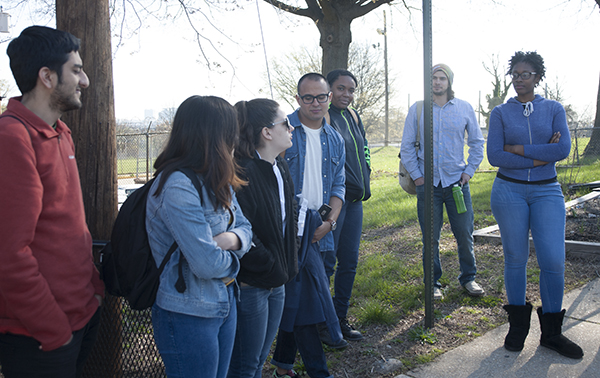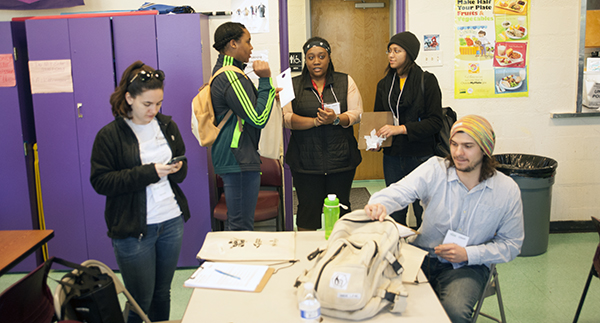Knauss legislative fellowships in Congress help build careers — and they're fun and educational. See our video and fact sheet for details.
Annual Climate Risk Survey Homes in on Vulnerable Maryland Communities
People living in socially and economically stressed communities in Maryland don't feel prepared to deal with the expected effects of global climate change, like increased coastal flooding and urban heat waves.
That was among the findings from a door-to-door survey of four Maryland communities in which socioeconomic factors, like lack of access to resources, leave residents less able to prepare for and recover from climate change. The community survey was an add-on to an ongoing statewide survey, started in 2013, of how Maryland residents perceive climate change and its future risks. The Center for Climate Change Communication at George Mason University in Virginia conducted both the statewide and community-level surveys.
The Perceptions of Community Resilience study canvassed four predominantly African American neighborhoods: Glassmanor-Oxon Hill (in Prince George’s County) and Oliver-Broadway East, Sandtown-Winchester, and Westport (in Baltimore). People in these communities are “at the nexus of high risk and vulnerability,” says Karen Akerlof, a research assistant professor at George Mason University and the lead investigator on the surveys. “Unfortunately those who are most at risk from climate change may have the least resources to be able to adapt.”
To conduct the survey, students from Bowie State, George Mason, and Morgan State Universities fanned out across the four neighborhoods in teams of two or three. They administered a 30-question survey about how residents perceive their risk from climate change and how prepared they think they are to meet those risks in the future.
 |
|
College students from Bowie State, George Mason, and Morgan State Universities meet up at the Westport Community Boys & Girls Club before going out into the neighborhood in teams to conduct a survey. Photo: Daniel Pendick |
The survey found that a majority of residents (about 60%) believe that climate change is likely to cause significant harm to their communities in the next several years. They also believe—as do residents of the state as a whole—that climate change and related problems, such as air and water pollution, pose a risk to their personal health and well-being
In addition, the survey asked residents to rank the amount of “social capital” available in their communities to respond to climate change. Social capital is the resources a community can draw on to prepare for the impacts of climate change. It includes the ability of neighborhoods to stay informed about risks and work with government and nonprofits to prepare for and recover from environmental impacts of climate change. Social capital makes communities more resilient to climate change.
Residents in the Baltimore and Prince George’s County communities “rank their communities as lower in social capital than other communities in the state,” according to a summary of the community survey. Most residents also said they supported efforts by state and local governments to help them prepare for climate change.
Those efforts are already underway. In fact, the four neighborhoods were chosen for the community survey because of ongoing or planned projects in these areas to enhance community resilience to climate change.
In Baltimore, for example, the city’s Office of Sustainability is working to create “resilience hubs” in community centers or churches in Oliver-Broadway East, Sandtown-Winchester, and Westport. The hubs will provide shelter, food, water, and other resources during emergencies. Almost two-thirds of residents in the community survey said they would be likely or highly likely to use the hubs. Prince George’s County is considering the creation of a county combined services center in Glassmanor-Oxon Hill that would bring its agencies together in one building.
 |
|
Survey teams prepare to conduct a round of door-to-door surveys in the Westport neighborhood in Baltimore. The low-lying community is vulnerable to the impacts of climate change. Photo: Daniel Pendick |
The community survey was a step toward helping socially vulnerable communities to adapt to climate change. “If we can find out how Marylanders feel or act or think about climate change, communication efforts can be tailored in ways that can be useful, as well as tailoring responses to the specific needs of communities,” says Jennifer Dindinger, a Maryland Sea Grant Extension watershed restoration specialist who works with communities to prepare for the effects of climate change.
Community-level surveys can also help to tailor proposed solutions to local needs and concerns, like the climate hubs planned for Baltimore. “As governments, businesses, and non-profits make decisions about how to assist communities in preparing for the effects of climate change,” Akerlof says, “it is important that residents take part in those discussions and prioritize which issues are the most critical for them."
Read the George Mason University press release for more details about the findings of the Perceptions of Community Resilience study.
Photo, top left: Karen Akerlof (left) discusses survey strategy with two of the college students hired to help canvass residents of the Westport neighborhood of Baltimore to learn more about residents’ attitudes about climate change. Photo: Daniel Pendick
For more information about the statewide and community-level studies, contact:
Karen Akerlof
Center for Climate Change Communication
George Mason University
kakerlof@gmu.edu
For more information about efforts to enhance community resilience in Maryland, contact:
Jennifer Dindinger
Watershed Restoration Specialist
University of Maryland Sea Grant Extension
jdinding@umd.edu
Learn more about Maryland Sea Grant’s work on climate change:
See all posts from the On the Bay blog




